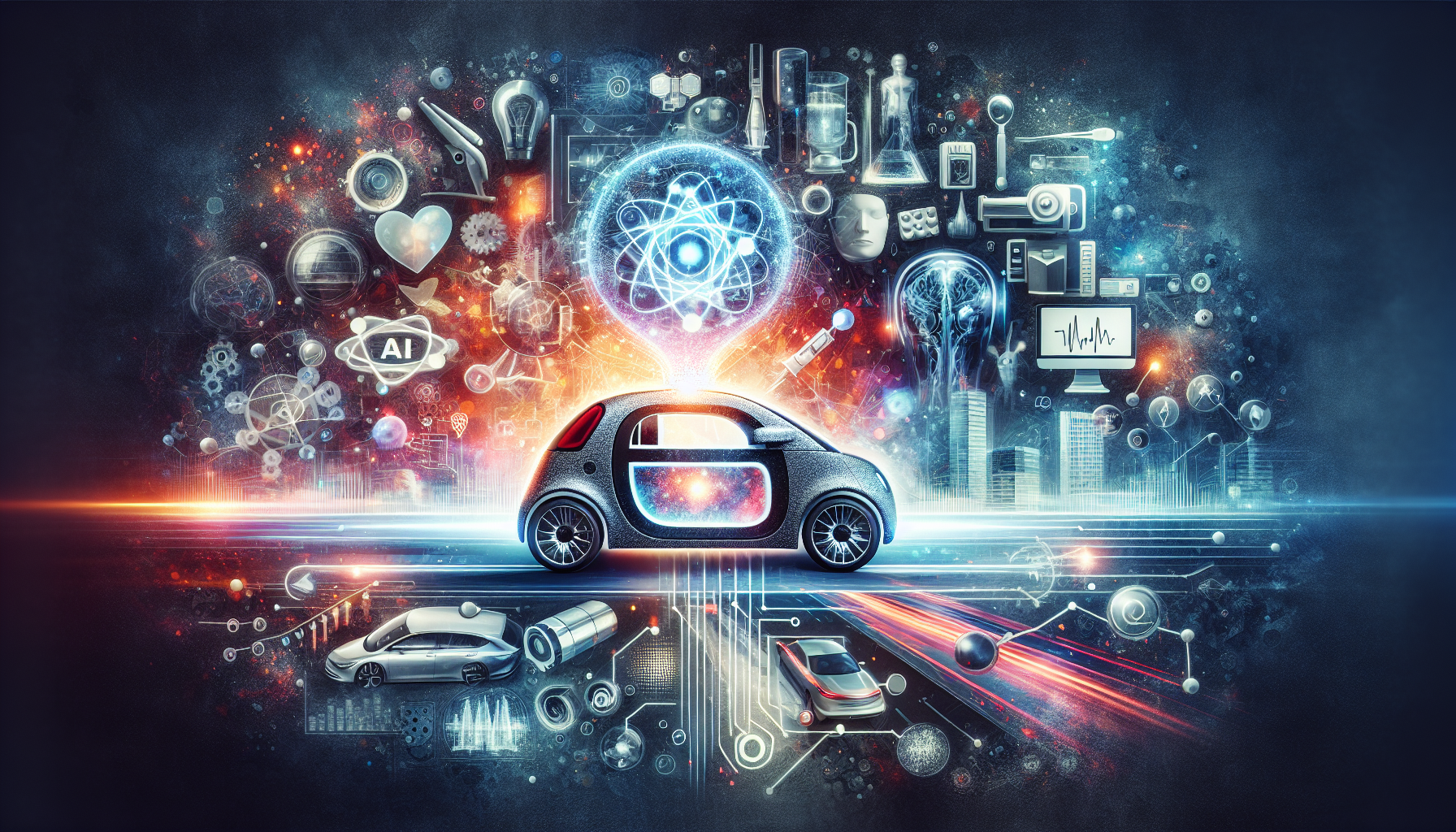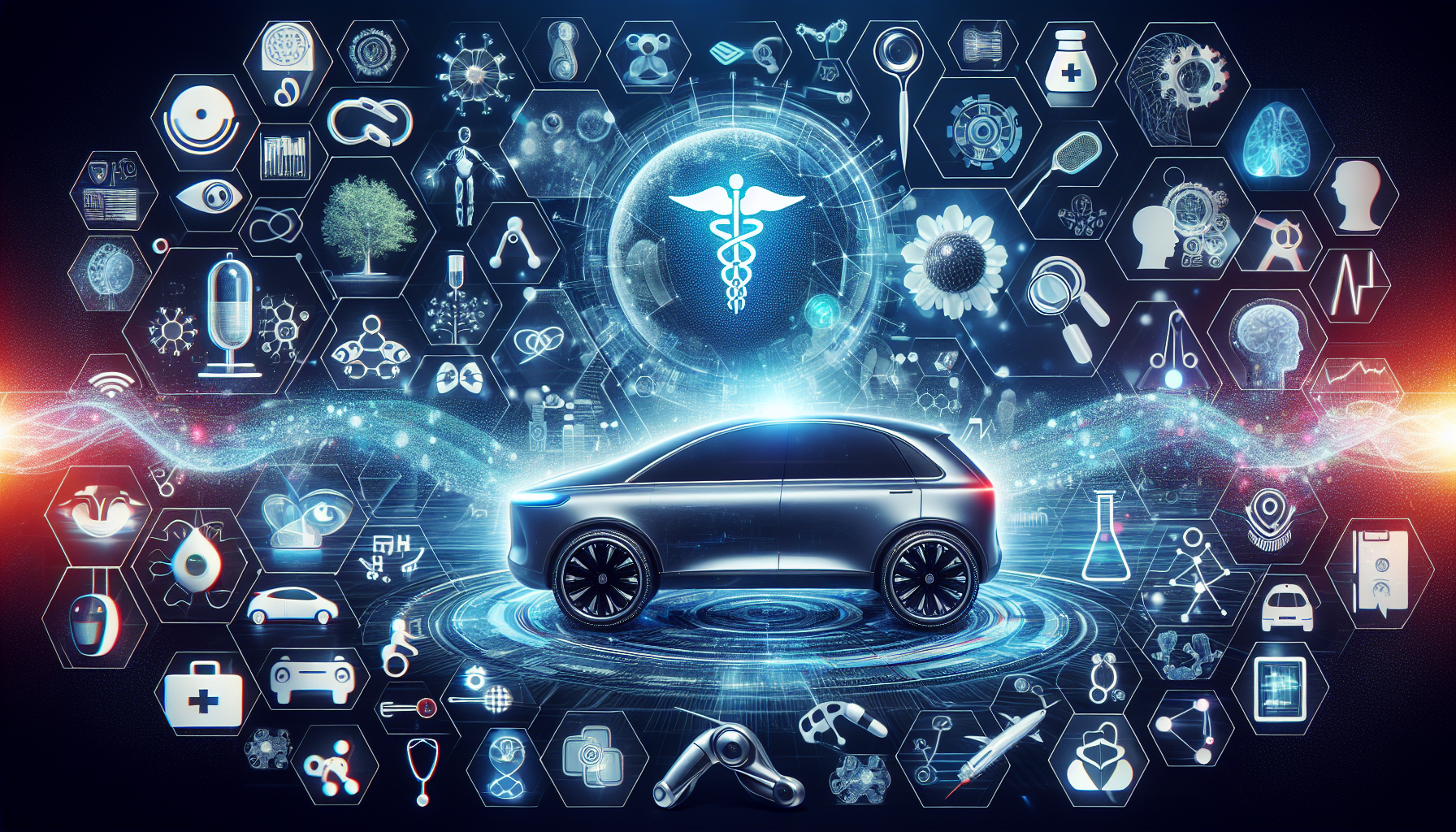In this article, you will discover a range of captivating real-world examples that showcase the practical applications of AI. From revolutionizing healthcare to improving transportation systems, AI has permeated various industries, enhancing efficiency, accuracy, and innovation. Prepare to be amazed as you explore how AI has transformed the way we interact with technology, providing solutions to complex problems and paving the way for a future defined by artificial intelligence. So, let’s dive into these fascinating examples that will undoubtedly expand your understanding of AI’s endless possibilities.
Healthcare
Artificial Intelligence (AI) has made significant advancements and has revolutionized various industries, including healthcare. In the field of diagnosis and treatment, AI has proven to be an invaluable tool. With the ability to analyze vast amounts of medical data quickly and accurately, AI algorithms can assist doctors in making precise diagnoses and developing effective treatment plans. By providing doctors with valuable insights and recommendations based on patterns and trends in patient data, AI has the potential to improve healthcare outcomes and save lives.
Additionally, AI has shown great promise in drug discovery. The traditional process of identifying and testing new drugs can be time-consuming and costly. However, with the use of AI, scientists can analyze vast databases of molecular structures and predict the effectiveness of potential drugs. This enables the identification of promising compounds with higher efficiency, ultimately speeding up the drug discovery process and leading to the development of life-saving medications faster.
Robot-assisted surgery is another area where AI is making a significant impact. By combining AI algorithms with robotic tools, surgeons are able to perform complex procedures with higher precision and accuracy. These robotic systems can be programmed to navigate through delicate tissues and adapt to the patient’s anatomy, reducing the risk of human error. As a result, AI-powered robot-assisted surgery not only enhances surgical outcomes but also minimizes the invasiveness of procedures, leading to faster recovery times for patients.
Health monitoring is yet another domain where AI is proving its worth. With the rising popularity of wearable devices, such as fitness trackers and smartwatches, individuals have access to continuous real-time data about their health. AI algorithms can analyze this data, detect patterns, and provide actionable insights to users. Whether it’s monitoring heart rate variability, sleep patterns, or identifying potential health issues, AI-powered health monitoring can help individuals take proactive steps towards maintaining their well-being.
Finance
The finance industry is no stranger to the applications of AI. One of the key areas where AI is utilized is in fraud detection. AI algorithms can analyze vast amounts of financial data to identify patterns and anomalies that may indicate fraudulent activity. By continuously learning from historical data and adapting to new fraud techniques, AI systems can quickly detect and prevent fraudulent transactions, safeguarding the assets of individuals and institutions alike.
Risk assessment is another domain where AI plays a crucial role. Financial institutions rely on accurate risk assessment to make informed decisions about lending, investments, and insurance. AI algorithms can analyze various data points, including credit history, market trends, and economic indicators to predict the likelihood of risks. By providing real-time risk assessments, AI enables institutions to make more informed and accurate decisions, ultimately mitigating potential losses.
Automated trading, often known as algorithmic trading, is another application of AI in finance. With the ability to process vast amounts of financial data in milliseconds, AI algorithms can execute trades based on pre-defined criteria and market conditions. By removing human emotions from the equation, these algorithms can make decisions faster, adapt to market changes, and potentially maximize returns.
Customer service is an essential aspect of the finance industry, and AI has proved to be a valuable asset in this domain. With the help of natural language processing (NLP) algorithms, chatbots can provide instant and personalized support to customers, answering commonly asked questions and resolving simple issues. These AI-powered chatbots can handle a large volume of customer inquiries simultaneously, improving response times and overall customer satisfaction.

Transportation
Artificial Intelligence is driving significant advancements in the transportation industry, making it more efficient, sustainable, and safe. Autonomous vehicles are one of the most notable applications of AI in transportation. AI algorithms analyze sensor data from cameras, radar, and lidar to navigate roads, detect obstacles, and make real-time decisions. By removing the need for human drivers, autonomous vehicles have the potential to reduce accidents caused by human error and improve traffic efficiency.
Traffic management is another area where AI plays a crucial role. AI-powered systems can analyze real-time traffic data from various sources, such as GPS and sensors, to predict traffic patterns and optimize traffic flow. By adjusting traffic signals, suggesting alternative routes, and coordinating with autonomous vehicles, AI-powered traffic management can reduce congestion, shorten travel times, and improve overall traffic conditions.
Predictive maintenance is essential for ensuring the reliability and safety of transportation infrastructure. AI algorithms can analyze sensor data from vehicles, trains, or infrastructure components to detect anomalies and predict potential failures. By identifying maintenance needs in advance, transportation authorities can plan maintenance activities more effectively, reducing the chances of unexpected breakdowns, improving safety, and minimizing disruptions in services.
Route optimization is another application of AI in transportation that benefits both individuals and logistics companies. By analyzing various factors such as traffic conditions, weather, and delivery schedules, AI algorithms can determine the most efficient routes for transportation. Whether it’s for personal navigation or optimizing delivery routes for logistics companies, AI-powered route optimization can save time, reduce fuel consumption, and improve overall efficiency.
Education
Artificial Intelligence has the potential to transform education by personalizing learning experiences, improving teaching methodologies, and enhancing educational content. Personalized learning is an application of AI that adapts educational materials and teaching methods to the individual needs and preferences of students. By analyzing data about students’ learning styles, progress, and abilities, AI algorithms can tailor learning experiences to optimize engagement and maximize learning outcomes.
Intelligent tutoring systems are another application of AI in education. These systems use AI algorithms to provide students with personalized guidance and feedback, simulating the role of a human tutor. By analyzing students’ responses to questions and identifying areas of weakness, intelligent tutoring systems can provide targeted explanations and additional practice materials, ultimately improving students’ understanding of the subject matter.
Automated grading is a time-consuming task for educators, especially when dealing with large volumes of assignments or exams. AI-powered automated grading systems can analyze students’ responses using natural language processing and machine learning algorithms, providing quick and objective evaluations. By automating the grading process, educators can save time and focus on providing valuable feedback and support to students.
Educational content generation is an emerging field where AI is being utilized to create tailored educational materials. AI algorithms can analyze various data sources, including textbooks, research papers, and online resources, to generate customized educational content. This content can be adapted to different learning styles and cater to the specific needs of students, promoting deeper understanding and engagement.

Retail
Artificial Intelligence has transformed the retail industry, providing businesses with innovative solutions that enhance customer experiences, optimize operations, and improve decision-making processes. Recommendation systems are widely used in e-commerce platforms to provide personalized product recommendations to customers. These AI algorithms analyze customer preferences, browsing history, and purchase behavior to suggest products that are likely to be of interest, ultimately improving customer satisfaction and boosting sales.
Inventory management is another crucial area where AI plays a vital role in retail. AI algorithms can analyze historical sales data, current market trends, and even external factors such as weather conditions to forecast demand accurately. By optimizing inventory levels and ensuring the availability of products at the right time, AI-powered inventory management systems minimize stockouts, reduce excess inventory, and improve operational efficiency.
Chatbots have become increasingly popular in the retail industry, providing instant and personalized customer support. Using natural language processing algorithms, chatbots can understand and respond to customer queries, provide product recommendations, and even process simple transactions. By automating customer service processes, chatbots can handle a large volume of inquiries simultaneously, improve response times, and enhance overall customer satisfaction.
Optimizing the supply chain is another application of AI in retail that can have a significant impact on operational efficiency. AI algorithms can analyze various data points, such as supplier performance, transportation costs, and market demand, to optimize supply chain processes. By improving demand forecasting, streamlining logistics, and identifying areas for cost savings, AI-powered supply chain optimization systems can result in lower operational costs, faster delivery times, and improved customer satisfaction.
Marketing and Advertising
Artificial Intelligence has transformed the marketing and advertising industry, enabling businesses to analyze customer data, personalize campaigns, and optimize marketing strategies. Targeted advertising is a prime example of AI’s impact in this domain. By analyzing customer behavior, preferences, and demographics, AI algorithms can deliver personalized advertisements to individuals, increasing the likelihood of conversions and maximizing return on investment.
Customer segmentation is another application of AI in marketing and advertising. By analyzing vast amounts of customer data, AI algorithms can identify distinct segments within a target audience. This segmentation allows businesses to tailor their marketing strategies and messaging to each segment’s unique preferences and needs, ultimately improving the effectiveness of marketing campaigns and driving customer engagement.
Content generation is an emerging field where AI is making significant strides. By leveraging natural language processing and machine learning algorithms, AI systems can generate content for various marketing channels, including blogs, social media posts, and email campaigns. Whether it’s creating catchy headlines, engaging social media captions, or personalized email content, AI-powered content generation can save time and resources for businesses while maintaining quality and consistency.
Social media analysis is another valuable application of AI in marketing and advertising. AI algorithms can analyze social media data, including posts, comments, and engagement metrics, to gain valuable insights into customer sentiment, preferences, and trends. By monitoring social media conversations, businesses can better understand their target audience, identify influencers, and adapt their marketing strategies to align with current trends and customer demands.

Manufacturing
Artificial Intelligence has revolutionized the manufacturing industry, enabling businesses to improve quality control, optimize production processes, and streamline supply chain management. Quality control is an essential aspect of manufacturing, and AI algorithms can play a vital role in this domain. By analyzing sensor data, visual inspections, and historical data, AI systems can identify defects or anomalies in real-time. This allows for early detection of quality issues, reducing waste, minimizing rework, and improving overall product quality.
Predictive maintenance is another application of AI that has transformed the manufacturing industry. By analyzing sensor data from machinery and equipment, AI algorithms can predict potential failures and maintenance needs in advance. This proactive approach allows manufacturers to schedule maintenance activities strategically, minimizing unplanned downtime, optimizing equipment performance, and reducing maintenance costs.
Supply chain management is another area where AI is making a significant impact. AI algorithms can analyze various factors, including demand forecasts, inventory levels, and supplier performance, to optimize supply chain processes. By optimizing inventory levels, reducing lead times, and improving logistics, AI-powered supply chain management systems can enhance operational efficiency, reduce costs, and improve customer satisfaction.
Optimizing production processes is another crucial application of AI in manufacturing. AI algorithms can analyze data from various sources, including machine sensors and production line data, to identify bottlenecks, optimize workflows, and improve overall efficiency. By providing real-time insights and recommendations, AI-powered systems can help manufacturers identify opportunities for process improvement, reduce cycle times, and increase productivity.
Energy
Artificial Intelligence has the potential to revolutionize the energy industry, enabling businesses to optimize energy consumption, forecast renewable energy generation, and detect faults to prevent potential disruptions. Smart grids are a prime example of AI’s impact in this domain. By utilizing AI algorithms, smart grids can analyze data from various sources, including electricity consumption patterns, weather forecasts, and grid performance, to optimize energy distribution. This results in reduced energy wastage, improved efficiency, and enhanced reliability of energy supply.
Energy consumption optimization is another critical application of AI in the energy industry. By analyzing historical consumption data and external factors such as weather patterns, AI algorithms can predict energy demands and optimize energy usage in real-time. This allows businesses and individuals to make informed decisions about energy consumption, reduce demand during peak periods, and achieve cost savings.
Renewable energy forecasting is another area where AI plays a vital role. As the demand for renewable energy sources grows, accurate forecasting of solar and wind energy generation becomes essential. AI algorithms can analyze historical weather patterns, real-time sensor data, and energy generation data to predict renewable energy generation accurately. This enables energy operators to optimize energy distribution, balance supply and demand, and integrate renewable energy sources into the grid more effectively.
Fault detection and prevention is another application of AI in the energy industry. AI algorithms can analyze sensor data from energy infrastructure, such as power plants or transmission lines, to detect anomalies or potential faults. By identifying these issues in advance, energy operators can take proactive measures to prevent disruptions, optimize maintenance activities, and ensure the reliable and uninterrupted supply of energy.

Security
Artificial Intelligence has a significant impact on enhancing security measures, ranging from video surveillance to threat detection, cybersecurity, and biometric identification. Video surveillance systems powered by AI algorithms can analyze real-time video footage to identify potential security threats or suspicious activities. By combining computer vision techniques with machine learning algorithms, AI-powered video surveillance systems can detect and identify unauthorized individuals, monitor crowd behavior, and enhance overall security in public spaces.
Threat detection is another critical application of AI in security. By analyzing vast amounts of data from various sources, including network traffic, social media, and external threat intelligence feeds, AI algorithms can identify patterns and indicators of potential cyber threats or attacks. By providing real-time threat detection and alerts, AI-powered security systems enable businesses and individuals to respond quickly and effectively to mitigate potential risks.
Cybersecurity is a constant challenge in today’s digital world, and AI has become a valuable tool in combating cyber threats. AI algorithms can analyze network traffic, system logs, and user behavior patterns to identify anomalies and potential security breaches. By continuously monitoring and analyzing data, AI-powered cybersecurity systems can detect and respond to threats in real-time, protect sensitive information, and prevent data breaches.
Biometric identification is a secure and reliable method of verifying individuals’ identities, and AI algorithms play a crucial role in this domain. By analyzing biometric data such as fingerprints, facial features, or voice patterns, AI-powered biometric identification systems can accurately authenticate individuals. Whether it’s for access control, border security, or online authentication, AI-powered biometric identification systems provide an extra layer of security and help prevent identity fraud.
Entertainment
Artificial Intelligence has transformed the entertainment industry, providing innovative solutions such as content recommendation, music and movie generation, virtual reality, and language translation. Content recommendation systems have become ubiquitous, personalized interfaces that help users discover relevant movies, TV shows, music, and other forms of entertainment. AI algorithms analyze user preferences, viewing history, and ratings to provide personalized recommendations, enhancing user experiences and promoting content discovery.
Music and movie generation is an exciting application of AI in the entertainment industry. AI algorithms can analyze large datasets of existing music or movies to create original compositions or scripts. By analyzing patterns, emotions, and various elements of existing content, AI-powered algorithms can generate new music or movies that align with specific genres or styles. This opens up new possibilities for content creation and provides an endless source of inspiration for artists and creators.
Virtual Reality (VR) is revolutionizing the entertainment experience, and AI is a vital component in creating immersive experiences. AI algorithms can analyze user interactions, preferences, and responses in real-time to adapt and personalize VR experiences. This enables dynamic and interactive storytelling, creating virtual worlds and characters that can respond intelligently to users’ actions and emotions, ultimately enhancing the sense of immersion and engagement.
Language translation is another application of AI in the entertainment industry that has become indispensable. AI-powered language translation systems can analyze large volumes of text data in different languages to provide real-time translations. Whether it’s subtitling foreign films, translating video game dialogue, or enabling global communication, AI-powered language translation opens up new possibilities for cross-cultural engagement and content localization.
In conclusion, Artificial Intelligence has brought about a multitude of real-world applications across various industries. From healthcare to finance, transportation to education, retail to manufacturing, energy to security, and entertainment, AI is transforming processes, improving efficiency, and enhancing our daily lives. With continued advancements and investments in AI research, the possibilities are endless, and the potential for AI to shape our future is profound.







Leave a Reply